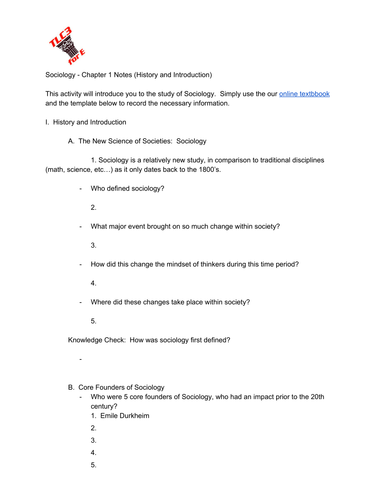Have you ever wondered why people behave the way they do? Why some societies are structured differently than others? Why certain social issues persist despite efforts to address them? These are just some of the questions that sociology attempts to answer. It’s the study of human society and its various aspects, offering a lens through which we can understand the complexities of our social world.

Image: www.teacherspayteachers.com
This guide will explore the fundamental concepts and principles of sociology, diving into its history, core themes, and practical applications. We will uncover how sociologists use research methods to study social phenomena, understand how social structures shape our lives, and learn about the diverse perspectives within the field. So, let’s embark on this journey of understanding human society and its intricate workings.
What is Sociology?
Sociology is a social science that examines human society and its intricate workings. It seeks to understand the patterns, processes, and structures that govern social life, focusing on how individuals interact, form groups, and create institutions. Unlike psychology, which focuses on the individual, sociology examines the collective aspects of human existence, exploring the interplay between individuals and society.
Key Concepts in Sociology
1. Social Structure:
This concept refers to the underlying patterns of social relationships and institutions that shape individuals’ lives. It encompasses various elements, including:
- Social Institutions: Organized systems of established rules and practices governing a particular aspect of social life (e.g., family, education, religion, economics).
- Social Groups: Collections of individuals who share common characteristics or interests (e.g., families, workplaces, religious groups, clubs).
- Social Roles: Expected patterns of behavior associated with particular positions within a social group or institution (e.g., student, teacher, parent, doctor).
- Social Norms: Shared expectations and rules governing behavior in a society. They can be formal laws or informal customs, and violations often result in sanctions.

Image: www.tes.com
2. Social Interaction:
This concept focuses on how individuals communicate, relate to each other, and influence each other’s behavior. It encompasses various forms of interaction, including:
- Verbal and Nonverbal Communication: Language, gestures, facial expressions, and body language.
- Socialization: The process by which individuals learn the values, norms, and behaviors of their society.
- Social Groups and Networks: The ways in which individuals connect and influence each other within groups and social networks.
3. Social Change:
This concept explores how societies evolve and transform over time. Social change can be driven by various factors, including:
- Technological Advancements: New technologies can alter social structures, relationships, and communication patterns.
- Economic Shifts: Changes in economic systems and production methods can lead to social transformations.
- Political Upheavals: Revolutions, wars, and political reforms can drastically reshape societies.
- Cultural Movements: Shifts in cultural values and beliefs can influence social norms and behaviors.
History of Sociology
Sociology emerged as a distinct field of study in the 19th century, amidst profound societal transformations brought about by the Industrial Revolution, urbanization, and the rise of modern nation-states.
Key Figures:
- Auguste Comte (1798-1857): French philosopher who coined the term “sociology” and envisioned it as a scientific study of society.
- Emile Durkheim (1858-1917): French sociologist who emphasized the importance of social facts, social solidarity, and the role of social institutions in shaping individuals’ behavior.
- Karl Marx (1818-1883): German philosopher and economist who analyzed the conflict between social classes and the relationship between economic systems and social structures.
- Max Weber (1864-1920): German sociologist who focused on the role of rationalization, bureaucracy, and social action in shaping modern society.
The Importance of Sociology
Understanding sociology is crucial for several reasons:
- Informed Citizenship: Sociology helps us understand the complexities of social issues, empowering us to engage in informed debates and contribute to positive societal change.
- Understanding Ourselves: Sociology provides insights into the social forces that shape our identities, beliefs, and behaviors, helping us understand ourselves and our place in the world.
- Career Opportunities: A background in sociology can be valuable in various careers, including social work, research, education, government, and non-profit organizations.
Guided Reading Section 1 Answer Key
This section provides the answer key for the guided reading questions in Section 1 of your textbook. The questions may vary based on the specific textbook used, but they typically cover the foundational concepts and history of sociology.
Example Questions and Answers:
Question: What is sociology?
Answer: Sociology is the scientific study of human society and social behavior. It examines how individuals interact, form groups, and create institutions.
Question: What are some of the key concepts in sociology?
Answer: Some key concepts include social structure, social interaction, social change, and social inequality.
Question: Who are some of the prominent early figures in sociology?
Answer: Key figures include Auguste Comte, Émile Durkheim, Karl Marx, and Max Weber.
Question: Why is studying sociology important?
Answer: Sociology helps us understand the complexities of social issues, engage in informed debates, and make informed decisions about our lives and societies. It also provides valuable insights for careers in various fields.
What Is Sociology Guided Reading Section 1 Answer Key
Conclusion
This guide has provided a basic introduction to the exciting field of sociology. As you delve deeper into this subject, remember that it is a dynamic and evolving field constantly seeking to understand the complexities of our social world. Sociology helps us make sense of the human experience and equips us to be more informed, engaged citizens in a rapidly changing world. Continue to explore the numerous resources available to enhance your understanding of this crucial discipline. Share your insights, engage in discussions, and contribute to building a better society.

:max_bytes(150000):strip_icc()/OrangeGloEverydayHardwoodFloorCleaner22oz-5a95a4dd04d1cf0037cbd59c.jpeg?w=740&resize=740,414&ssl=1)




